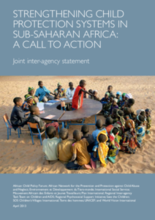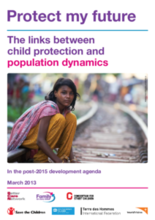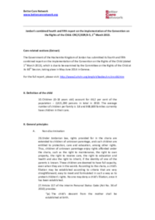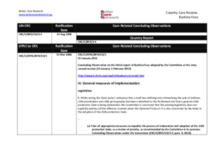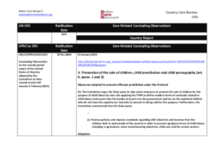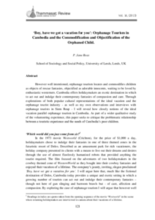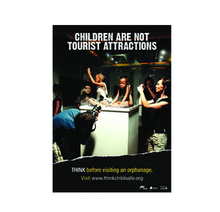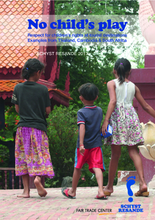Displaying 381 - 390 of 469
Thirteen agencies working in Africa have issued a Joint Statement calling on African governments to strengthen their child protection systems to secure the right of children to a life free from violence, abuse, exploitation and neglect in both emergency and non-emergency settings.
This paper is part of an inter-agency series on the links between child protection and major development goals. The report focuses on the links between child protection and population dynamics as they relate to the post-2015 Millennium Development Goals agenda.
The Government of the Hashemite Kingdom of Jordan has submitted its fourth and fifth combined report on the implementation of the Convention on the Rights of the Child (dated 1st March 2013).
Care related Concluding Observations adopted by the Committee on the Rights of the Child on the initial report of Burkina Faso under the Optional Protocol to the Convention on the Rights of the Child on the sale of children, child prostitution and child pornography.
This country care review includes the care related Concluding Observations adopted by the Committee on the Rights of the Child as part of its examination of the United States of America’ second periodic report under the Optional Protocol to the Convention on the Rights of the Child on the sale of children, child prostitution and child pornography, as well as other care-related concluding observations, ratification dates, and links to the Universal Periodic Review and Hague Intercountry Adoption Country Profile.
This infographic provides statistics on children globally. It then provides information as it relates to the six objectives of John Snow Inc.'s Knowledge Management Services in relation to Orphans and Vulnerable Children, including children living in institutions, HIV/AIDS, child sexual exploitation, and more.
As part of a wider qualitative study of the volunteering experience, this paper seeks to critique the problematic relationship between a touristic experience and the needs of Cambodia’s poor children.
The ChildSafe network has produced important information for people who might be traveling abroad and can be confronted by situations where children are in distress or at risk of being abused or harmed, including through the practice of "orphan tourism".
The purpose of this qualitative research was twofold: the first was to explore the phenomenon of homebound girls in Jordan and to understand the reasons that led to their confinement. By shedding light on and investigating this phenomenon, the second purpose of this research, in turn, was to identify possible interventions to allow these girls access to education and strengthen their social development.
This report was commissioned by the Swedish network Schyst Resande and conducted by the Fair Trade Center, with the overall objective of raising awareness of children’s rights in relation to tourism and travel destinations which many Swedish tourists visit.

